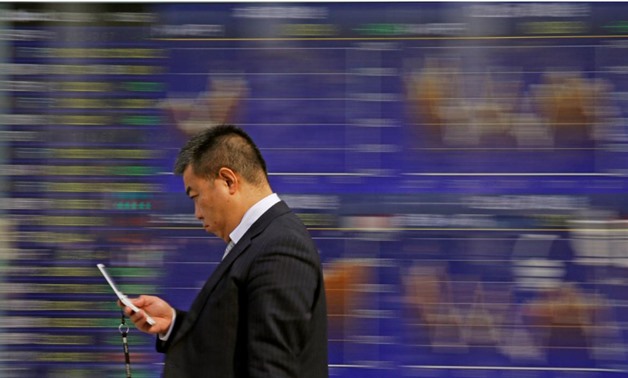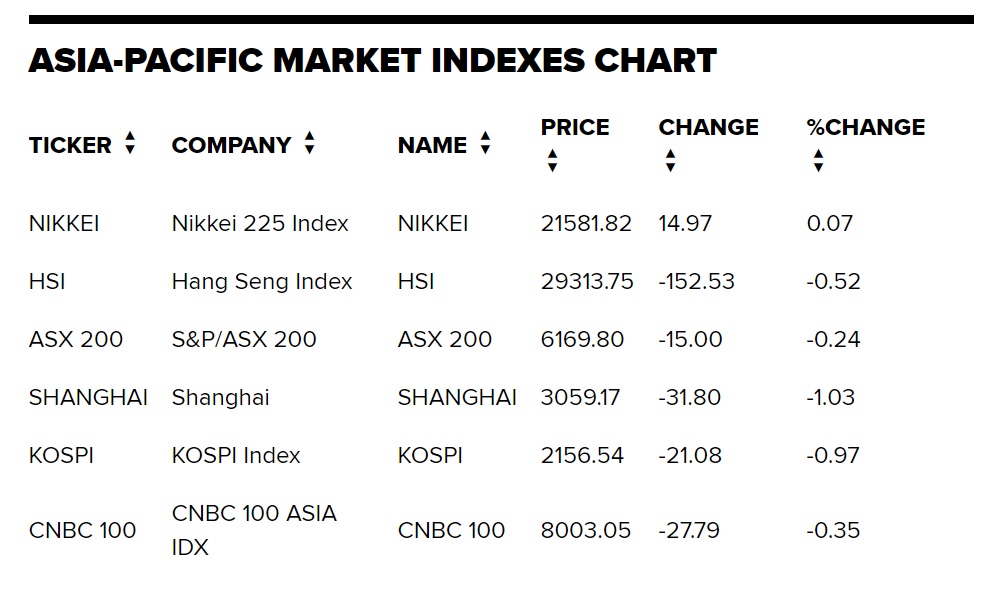[Analytics] Asia stocks slip amid US-China trade uncertainty

A man walks past an electronic stock quotation board outside a brokerage in Tokyo, Japan, February 9, 2018. REUTERS/Toru Hanai
Mainland Chinese markets were largely flat, while Japan and South Korean shares slipped. Overnight in U.S. markets, stocks were hit by a new wave of uncertainty on the U.S.-China trade front following a series of conflicting reports. Meanwhile, the U.S. Federal Reserve is set to announce its decision on interest rates later on Wednesday following its two-day monetary policy meeting. Eustance Huang specially for the CNBC.
Shares in Asia slipped on Wednesday morning following a series of conflicting reports on U.S.-China trade that surfaced overnight.
The mainland Chinese markets were tepid in early trade, with the Shanghai composite, Shenzhen composite and Shenzhen component all largely flat.
In Hong Kong, the Hang Seng index declined 0.39 percent.
The Nikkei 225 in Japan slipped 0.21 percent, as shares of Japanese conglomerate Softbank Group slipped 0.64 percent, while the Topix index was largely flat. Sony and Nintendo both saw their stock falling by more than 3 percent, following Google’s overnight announcement of its video game streaming platform.
Over in South Korea, the Kospi fell more than 1 percent as shares of industry heavyweight Samsung Electronics fell beyond 1.4 percent.
In Australia, the ASX 200 returned to negative territory, declining 0.38 percent.

Overnight on Wall Street, the Dow Jones Industrial Average slipped 26.72 points to close at 25,887.38 and the S&P 500 ended its trading day just below breakeven at 2,832.57. The Nasdaq Composite closed 0.1 percent higher at 7,723.95.
Stocks stateside began to roll over after Bloomberg News reported, citing people familiar with the matter, that U.S. officials are worried China may be pushing back against U.S. demands in the countries’ ongoing trade talks. The report also said Chinese negotiators are worried they have not received assurances that tariffs imposed on Chinese goods would be lifted once a deal is struck.
The major indexes on Wall Street briefly regained some of its footing after Dow Jones said the talks were in the final stages, noting Chinese Vice Premier Liu He will travel to Washington in the next few weeks.
Fed to announce interest rate decision
Meanwhile, the U.S. Federal Reserve is set to announce its decision on interest rates later on Wednesday following its two-day monetary policy meeting.
“We agree with market pricing and US economists that the (Federal Open Market Committee) will not change monetary policy,” Joseph Capurso, senior currency strategist at Commonwealth Bank of Australia, said in a morning note. He said that the committee is expected to decrease their forecast for the U.S. GDP, adding that the monthly economic data released so far suggests “very weak growth” for the first quarter of 2019.
Currencies and oil
The U.S. dollar index, which tracks the greenback against a basket of its peers, was at 96.453 after sliding from the 96.5 handle yesterday.
The Japanese yen traded at 111.58 against the dollar after seeing highs around 111.2 in the previous session. The Australian dollar changed hands at $0.7066 after declining from highs above $0.71 yesterday.
Oil prices declined in the morning of Asian trading hours, with the international benchmark Brent crude futures contract slipping 0.18 percent to $67.49 per barrel and U.S. crude futures shedding 0.34 percent to $58.83 per barrel.
CNBC’s Fred Imbert contributed to this report.